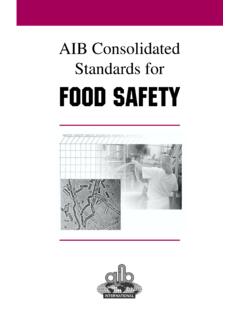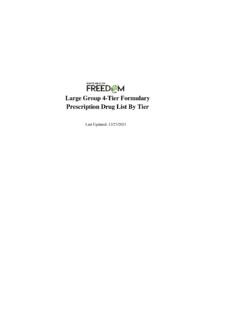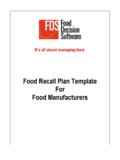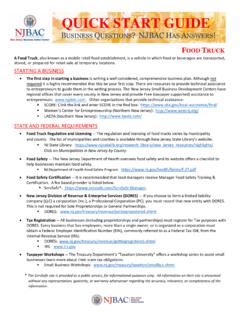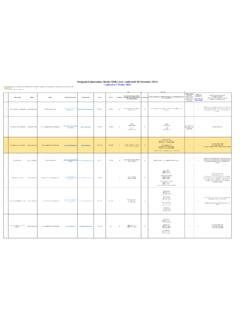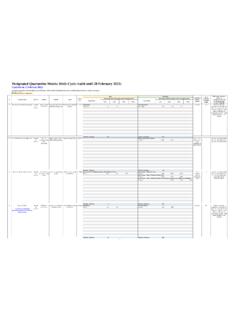Transcription of Guidance Document for Early Years Services: COVID-19
1 Guidance Document for Early Years Services: COVID-19 Guidance Document for Early Years Services: COVID-19 1 Version 1 4 June 2020 Contents Introduction .. 2 Section 1: Before opening Preparedness .. 3 1. Notification to Tusla .. 3 2. Policies .. 4 Infection control policy .. 4 Risk management policy .. 5 3. Staffing .. 6 Staff rostering .. 6 Staff training .. 6 4. Communication with parents/guardians and other visitors to the service.. 7 5. Physical environment building .. 8 Section 2: Open and Operating Key areas to consider in staying safe .. 11 1. Attendance records .. 11 2. Hand hygiene .. 11 3. Personal hygiene/ respiratory etiquette .. 12 4. Suspected case of covid - 19 .. 13 5. Maintaining social distancing where possible.
2 13 6. Environmental cleaning .. 14 7. Waste management .. 15 8. Personal protective equipment (PPE) .. 15 9. Ventilation .. 16 11. Outdoor play and activities .. 16 12. Food provision .. 17 13. Sleep/rest .. 17 14. Further Information .. 18 Guidance Document for Early Years Services: COVID-19 2 Version 1 4 June 2020 Introduction To prepare for the phased re-opening of Early Years services, the HSE Health Protection Surveillance Centre (HPSC) recently issued expert Guidance written specifically for the childcare sector. To assist providers, Tusla s Early Years Inspectorate has developed Guidance and information on how to plan for re-opening and operate as safely as possible during this period. We have also developed a COVID-19 self-assessment checklist to complement this Guidance Document . This checklist should be reviewed and updated on a continuous basis.
3 As an Early year provider, you are already familiar with how to manage and control the spread of infectious diseases in your service. COVID-19 presents a unique set of challenges. While many of the processes and procedures you previously had in place will help, they will need to be reviewed to take account of current public health advice. The spread of COVID-19 infection is minimised by organising children and staff into groups or "play-pods" to the extent that this is practical, and the application of play-pods is explained later in this Document . Regulatory inspections will recommence when services reopen in Phase 3. During inspections, Tusla will assess: 1. the procedures put in place to prevent the spread of COVID-19 in line with the self-assessment checklist 2. previous non-compliances not closed out and 3.
4 The overall care and well-being of children The wellbeing of children and providing a positive experience as they return to Early Years settings, is imperative at this time. It is incumbent on all of us to ensure the re-opening of services is child centred and that the safety and wellbeing of children is prioritised, while adhering to public health advice to minimise the spread of COVID-19 . Staff should be supported with information, training and Guidance to ensure their safety and the safety of the children that they care for. This Document is not intended to replace other COVID-19 Guidance that has been developed. Please see the HSE ( ) and HPSC websites ( ) for the most recent information and advice. If you have any queries around this Guidance Document or inspections, you can contact: Guidance Document for Early Years Services: COVID-19 3 Version 1 4 June 2020 Name Contact Email Region Margaret Monahan 091 775823 North West & Mid-West Karina Cullen 087 6873904 Dublin South & Dublin Mid Leinster Paula O'Keeffe 087 9115333 South East & South West Breda Hayes 087 1784593 Dublin North & Dublin North East Section 1.
5 Before opening Preparedness All registered Early Years childcare providers have a duty under regulation 23 to take all reasonable measures to safeguard the health, safety and welfare of the children attending the service and as cited in the Child Care Act 1991 ( Early Years Services) Regulations 2016 and the Child Care Act 1991 ( Early Years Services) (Amendment) Regulations This Document and the associated COVID-19 self-assessment checklist will help you to comply with your regulatory obligations. The 5 key areas to be developed or considered for implementation are: 1. Notification to Tusla 2. Policies Infection Control Policy Risk Management Policy 3. Staffing Staff Rostering Staff Training 4. Communication with Parents/Guardians 5. Physical Environment 1. Notification to Tusla A registered provider is required in accordance with Article 31 of the Child Care Act 1991 ( Early Years Services) Regulations 2016 to notify the Early Years ' registration office within three working days of becoming aware of a notifiable incident, by using a notification of incident form.
6 Incidents are defined in the regulations and include the diagnosis of a pre-school child attending the service, an employee, unpaid worker, contractor or other person working in the service as suffering from an infectious disease. Guidance Document for Early Years Services: COVID-19 4 Version 1 4 June 2020 COVID-19 is included in the list of infectious diseases and must be notified within three working days of becoming aware of a notifiable incident, A notification form for COVID-19 has been created and incorporates additional information regarding the risk of closure as a result of COVID-19 . The notification form for COVID-19 must be returned to Tusla: The purpose of this form is to monitor: (a) any pending COVID-19 public health issue in Early Years settings (b) the continuation of childcare provision, particularly in areas that have childcare shortages.
7 This system will be put in place as soon as services reopen in Phase 3 (29 June). The current system of notification remains in place for all other notifiable 2. Policies Infection control policy The spread of infection is minimised by organising children and staff into groups or "play-pods" to the extent that this is practical. A play-pod comprises a group of children and the adult(s) who remain with that group as keyworker(s). The intention is that the same staff and children stay together each day, through the day, as far as possible. The formation of play-pods may not be relevant in settings caring for smaller numbers of children. The objective is to limit interactions and sharing of facilities between play-pods. If childcare is delivered within a play-pod structure, in large rooms the play-pods may be separated by lightweight partitions of sufficient height to limit children interacting with each other.
8 There is no requirement for solid partitions from floor to ceiling. It is not possible to observe physical distancing when caring for a young child and it is not practical or advisable to enforce physical distancing between young children who are cared for as a group / play-pod. The policy on infection control for an Early Years service specifies the procedures to be followed to protect staff and Early Years children attending the service from the transmission of infections. The infection control policy should specify how the service will comply with the play-pod requirements and align with HPSC Guidance COVID-19 Infection Prevention and Control Guidance for settings providing childcare during the COVID-19 Pandemic and The management of infectious disease in childcare facilities and other childcare The core elements of the policy are also detailed in the Tusla Quality and Regulatory Framework (QRF).
9 4 2 Please see the following link for the notification of incidents (non- COVID-19 ) 3 4 Quality and Regulatory Framework (2018), Full Day Care and Part-Time Day Care Services, Tusla Early Years Inspectorate, Appendix 4, Policy on Infection Control, p98-99. Guidance Document for Early Years Services: COVID-19 5 Version 1 4 June 2020 An updated infection control policy incorporating the new cleaning schedule and revised drop off and collection procedures should be established in the service in response to COVID-19 . This policy must be circulated to staff and parents/guardians prior to reopening the service. This policy must reflect the advice issued by the HSE Health Protection Surveillance Centre (HPSC) in relation to reducing the spread and transmission of COVID-19 , and should signpost how social distancing, handwashing and coughing etiquette is being managed in the service to staff and parent/guardians.
10 Cleaning Schedules The cleaning schedule must specify the areas to be cleaned, particularly frequently touched surfaces, light switches, door handles, taps, toilet flush handles, tables It should specify the method of cleaning, frequency of cleaning, and the cleaning product to be used The cleaning schedule should include all toys, in particular mouthed toys, and also outdoor toys and equipment A procedure must be in place for cleaning and storage of soothers, Sippy cups, and oral sensory chewing devices A list of the cleaning products must be maintained with clear written directions for use Risk management policy The risk management policy for an Early Years service is a policy on the method the registered provider uses to assess any potential risks to the safety of the children attending the service.
